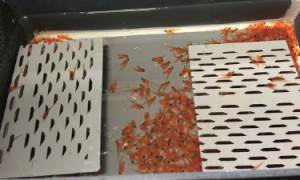on 22 febrero, 2016 by igjaugar in Proyectos, Silvia Martínez Llorens, Comentarios desactivados en Nuevo proyecto de investigación sobre la fisiología digestiva de salmones diploides y triploides
Nuevo proyecto de investigación sobre la fisiología digestiva de salmones diploides y triploides
 El grupo de Acuicultura y Biodiversidad dirigirá un trabajo para estudiar la fisiología digestiva de salmones diploides y triploides dentro del marco de un proyecto noruego «Functional ontogeny and physiology of the digestive system in juvenile diploid and triploid salmon (Salmo salar)” (acronym:FUNGUT), cuya responsable será la Dr. Silvia Martínez Llorens<
El grupo de Acuicultura y Biodiversidad dirigirá un trabajo para estudiar la fisiología digestiva de salmones diploides y triploides dentro del marco de un proyecto noruego «Functional ontogeny and physiology of the digestive system in juvenile diploid and triploid salmon (Salmo salar)” (acronym:FUNGUT), cuya responsable será la Dr. Silvia Martínez Llorens<
El proyecto noruego es liderado por el Dr. Velmurugu Puvanendran de Nofima. Participan otras instituciones y organizaciones como: University of Tromsø, University of Noriand, Salmobreed AS y Skretting AS
Summary
Pre-harvest sexual maturation and farmed escapees have
significant impact on the economic and environmental sustainability of the Atlantic salmon (Salmo salar) industry in Norway and elsewhere. Onset of sexual maturation results in energy allocation towards gonad maturation rather than body growth and also in deterioration of flesh quality. Accidental farmed escapees result in unwanted ecological and genetic interactions between wild and cultured fish. The production of sterile (triploid) fish has been considered an option for reproductive control and genetic containment in Atlantic salmon and other species meeting both industrial and environmental criteria. The performance triploid salmon is currently under large-scale commercial evaluation in Norway and the product will be available on the market soon.
As in the case of other artificially produced sterile fish, little is known about the nutritional requirement of triploid salmon. Identifying the optimal conditions for production of triploids is important, as is the characterization of the functional consequences (physiological and morphological) of the procedure. Recent studies carried out in our consortium have revealed significant differences in gut morphology between diploid and triploid fish raised on the same diets and under similar conditions. Detailed information on the ontogeny of the digestive system in triploids and its characterization in terms of morphology, key enzymes’ activity and gene expression is still lacking for salmon and other important cultured species. In this project, we wilI assess the functional ontogeny and physiology of triploid salmon digestive system using a specialized diet that could be in synergy with the gut morphology of the triploid salmon.


No hay comentarios